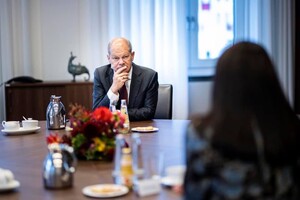Fluctuations in military aid to Ukraine expose the weakness of both the SPD-led coalition and German government structures.

In the middle of Europe is a ruthless war “against the ruling Social -Democratic Party of Germany “. At least, such a conclusion can be made by an ordinary observer of German politics. The leader of the SPD parliamentary faction, Rolf Mutzenich, condemned the Greens and the Free Democrats, members of the ruling coalition, for demanding heavy weapons for Ukraine. According to him, their demands are “irresponsible”.
His colleague Ralph Stegner on his Facebook page is angry at critics of his party's policy towards Russia, then attacks them with accusations. Former Foreign Minister Sigmar Gabriel spoke out against “dangerous conspiracy theories” about the German-Russian network of influence. But tearful self-pity will not fix anything, writes Fritz Stern, an expert at the Brookings Institution.
Read also: Scholz says he is doing everything he can to prevent World War III
On the contrary, the SPD's painful reaction says that the criticism has hit the mark. Chancellor Olaf Scholz himself became very “thin-skinned”. When members of the Bundestag visited Ukraine and called on it to increase military support, he called them “boys and girls.” In a recent interview, he said that sending heavy weapons to the Ukrainian army would make Germany and NATO a “party to the conflict”. The harsh truth is that the ruling party has earned even more criticism. Former Chancellor and chief gas lobbyist of Russia Gerhard Schroeder should have been expelled from the SPD a long time ago. But she still hasn't done it. It is also important that German courts investigate the links between the Prime Minister of the Eastern Federal State of Mecklenburg-Vorpommern, Manuela Schweisig, and Nord Stream-2, a gas pipeline wholly owned by Gazprom.
But Germany's selfish policies toward Russia, as well as its stubborn energy dependence on Moscow, are finding ardent supporters across the country's political spectrum. They added confidence to the Kremlin and made Vladimir Putin's war against Ukraine possible. However, it is useless to call on President and former Foreign Minister Frank-Walter Steinmeier to appear before a parliamentary inquiry commission. When he and Angela Merkel held power, they, along with other German politicians, decided they were doing exactly what German business and society wanted. “At least Steinmeier has publicly stated that he was wrong. If we talk about the Russian war of destruction and its relentless atrocities against Ukrainians, the blame for it lies with all of us, “said the German expert.
He added that Scholz and his government should be commended for their ambitious internal change agenda. Four days after the Russian invasion began, the chancellor acknowledged the need for a “turning point” in German energy and security policy. He also promised support for Ukraine. It is hard to imagine Angela Merkel and her CDU team doing something like this. Unfortunately, there are no good short-term options for Germany to help Kyiv and prevent the Kremlin from winning. As energy imports feed Russia's military machine, Berlin wants to stop buying Russian coal before the summer and oil by the end of the year. But he fears that abandoning gas imports earlier than 2024 could lead to a severe recession and political turmoil. And US Treasury Secretary Janet Ellen seems to agree.
Read also: Scandal in Germany: Scholz's ally promoted Nord Stream 2 for Kremlin money
Ukraine is begging to be given heavy weapons amid Russia's attempts to step up its offensive in Donbas. But on this issue, Scholz is confused, cunning and dusty, which irritates both Germany's allies and coalition partners. The lack of usable German equipment is real, as is the pressure of the increasingly pacifist “left wing” of the SPD. As a belated compromise, Berlin allows other NATO countries to hand over weapons to Kyiv.
Scholz is not helped by his rhetoric, which ranges from Stoic to dwarven. Some of its ministers are weaker than others. But the real problem of the German chancellor is different. Because Germany is a parliamentary democracy, its federal executive is weak by nature. The federal office is tiny compared to the governments of other major democracies. Scholz's main advisers are overwhelmed. And this is evident. For Scholz's coalition to survive and use power effectively, it needs to change its way of governing. The Ministry of Foreign Affairs is working on a national security strategy. And this is the first such document in the history of Germany. It should help define the country's strategic goals more clearly. But more urgently, the federal chancellery needs an effective national security apparatus that can give advice and help the government deal with the era of constant turmoil.
“All this is even more important because Germany has a special responsibility to stop evil Putin, “the article reads.
It will be recalled that Scholz has recently halved the list of weapons for Ukraine and may face resignation. In particular, all heavy weapons that the German military industry wanted to sell to Ukraine have disappeared from the list, and only three systems remain from Ukraine's initial 15 requests for weapons. NATO countries and adopt a neutral status so as not to “provoke” Russian dictator Vladimir Putin to attack. sanctions against Russia.




